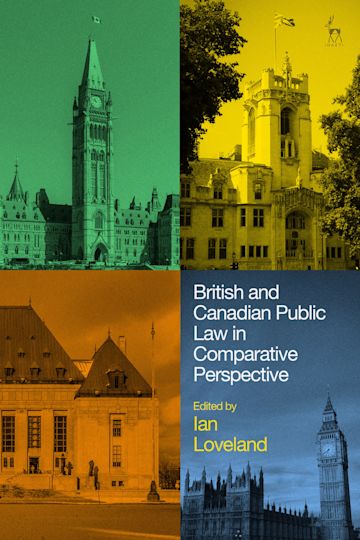Ian Loveland ed. British and Canadian Public Law in Comparative Perspective

Hart Publishing is kindly offering a discount for Administrative Law Matters readers who may be interested in acquiring Ian Loveland ed., British and Canadian Public Law in Comparative Perspective (Hart, 2021).
This is a very useful collection. As someone who has had a foot in both jurisdictions, I wholeheartedly echo Professor Loveland’s observation in the introduction about the utility of British-Canadian comparative law:
Acquiring a broader and deeper understanding of the ways in which Canadian courts and politicians have addressed issues of common concern to each of our respective countries is of course no guarantee that we will produce ‘better’ solutions to the issues we confront, but insofar as the legitimacy of our laws rests in part on the intellectual rigour with which they have been produced, applied and evaluated, cross-jurisdictional analysis of the sort undertaken here offers at least a small contribution to achieving that objective (at p. 5).
Here is the Table of Contents:
1. Introduction
Ian Loveland, City, University of London, UK
2. Assisted Dying
Carmen Draghici, City, University of London, UK
3. Voting Rights for Prisoners
Susan Easton,Brunel University, UK
4. Horizontal Effect of Human Rights in the UK and Canada
Nicholas Bamforth, University of Oxford, UK
5. Private Law, Public Law, Libel Law
Ian Loveland, City, University of London, UK
6. Criminalising Pornography
Tara BeattieDurham University, UK and Gavin Phillipson, Bristol University, UK
7. ‘Labouring under the Canadian Constitution’ Revisited
KD Ewing, Kings’ College, London, UK
8. Wearing Religious Symbols
Nicholas Hatzis, City, University of London, UK
9. Raising Children in Accordance with Unorthodox Religious Beliefs
Rachel Taylor, University of Oxford, UK
And the general description of the book:
This book explores current human rights controversies arising in UK law, in the light of the way such matters have been dealt with in Canada.
Canada’s Charter of Rights predates the United Kingdom’s Human Rights Act by some 20 years, and in the 40 years of the Charter’s existence, Canada’s Supreme Court has produced an increasingly sophisticated body of public law jurisprudence. In its judgments, it has addressed broad questions of constitutional principle relating to such matters as the meaning of proportionality, the ‘horizontal’ impact of human rights norms, and the proper role of judicial ‘dereference’ to legislative decision-making. The court has also considered, more narrowly, specific issues of political controversy such as assisted dying, voting rights for prisoners, the wearing of religious symbols, parental control of their children’s upbringing, the law regulating libel actions brought by politicians, pornography and labour rights. All of these issues are discussed in the book.
The contributions to this volume provide detailed analyses of such broad and narrow matters in a comparative perspective, and suggest that the United Kingdom’s public law jurisprudence and scholarship might benefit substantially from a closer engagement with their Canadian counterparts.
To claim the discount, enter UG8 at checkout.
This content has been updated on April 8, 2022 at 15:57.